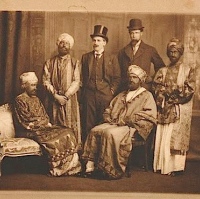This is very, very cool: a brand new Welcome To Weirsville piece I wrote just went up on the excellent The Cud site.
Here's a tease below - and, of course, if you want to read more pieces about fun and odd and strange and (yep) weird history check out my book Welcome To Weirdsville
The Imitation Of Those Who We Cannot Resemble
Almost all absurdity of conduct arises from the imitation of those who we cannot resemble. –Samuel Johnson
"Stop fidgeting, everyone ... Jimmy, that'd better not be gum in your mouth! No, Betty you can't go to the bathroom – you should have thought of that before we started ... now you'll just have to wait for the break. Okay, class, today we're going to be discussing possibly one of – if not the -- most important literary figures of the twentieth century: a woman who pretty much single handedly created what we consider to be modern literature..."

But, believe me, do some digging and there's juice a plenty in those dusty heroes – and while many of them certainly deserve to
 be
on their lofty pedestals you'll quickly learn that more than a few of
them might be wonderfully, delightfully, fun ... if not totally nuts.
be
on their lofty pedestals you'll quickly learn that more than a few of
them might be wonderfully, delightfully, fun ... if not totally nuts.Sarah Bernhardt, for instance, the legendary light of the stage, not only had a wooden leg, liked to sleep in her coffin, but also had quite a few ... involvements, shall we say, with people such as Victor Hugo and Gustavo Doré; Tycho Brahe, one of the brightest stars in astronomy not only had a fake metal nose (having lost his original in a duel) but kept an on-staff dwarf for the entertainment of his guests as well as himself; Richard Feynman, a Nobel Prize to his name, was an notorious humorist and prankster -- as well as quite the established cracksman, even claiming to have once easily got into the safe containing the plans for the first atomic bomb; Georges Simenon, the master French mystery author, not wrote over 200 novels but also claimed to have made love to 10,000 women; and let's not even get started on what M.Christian likes to do with balloon animals...
Which takes us to 1910, back when Britain quite literally ruled the waves: the time of what has been called by many to be the date of the greatest prank in all of history ... and the literary light who had a major part in it.
Now pranks were nothing new, especially for students of Cambridge, but this one – orchestrated by the infamously witty Horace de Vere Cole – set the bar. Horace tried afterward to top himself several times afterward, including infamously dumping horse ... leavings in the canals in Venice (to confuse the non-horse city residents), or arranging a group of bald men to sit in strategic places at the theater so that their domes, when viewed from the balcony, would spell out a rather (ahem) rude word, but his crowning achievement involved the pride of the British Navy, a few of his close friends, some costuming skills, the flag of Zanzibar, and a brilliant degree of planning – all of which rocked the world and nearly got one of them a sentence of ten of the best with a cane.
[MORE]

No comments:
Post a Comment